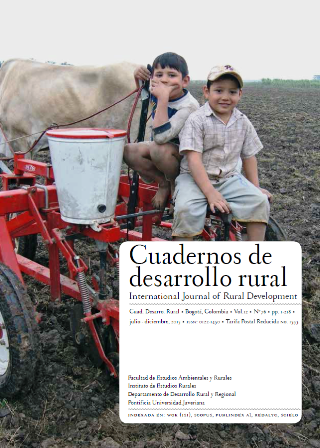Resumo
The Central American Strategy for Rural Territorial Development is a regional policy regarding the rural territorial development of the Central American Integration System. A group of stakeholders was interviewed in order to analyze whether its different stages have characteristics that support the implementation and achievement of its desired goals. The results indicate that the design of this policy shows positive characteristics regarding the participatory process that involves the major stakeholders. However, the situation is worse regarding the implementation, primarily because of its weak ties to integrate system institutions, lack of funding, and the low involvement of national governments.
Propriedade intelectual:
Instituto de Estudios Rurales, Facultad de Estudios Ambientales y Rurales, Pontificia Universidad Javeriana, Bogotá, Colombia.
O envio de um artigo para a revista Cuadernos de Desarrollo Rural, indica que o(s) autor(es) certifica(m) e aceita(m):
- Que ele não tem sido publicado, nem aceito para publicação em outra revista.
- Que, no caso de sua publicação for aceita, se o artigo ter uma versão previa como working paper (literatura cinza) ou aparecer numa site da internet, deverá ser retirado dele, ficando somente o título, resumo, palavras-chave e hipervinculo à revista.
- Que uma vez publicado em Cuadernos de Desarrollo Rural não será publicado em outra revista.
Ao enviar artigos para avaliação, o(s) autor(es) aceita(m) transferir(em) os direitos de autor à revista Cuadernos de Desarrollo Rural, para os efeitos da sua publicação na versão impressa ou eletrônica, mesmo firmará a licença de uso parcial anexa.
Responsabilidade de conteúdos:
O conteúdo dos artigos publicados por Cuadernos de Desarrollo Rural é de exclusiva responsabilidade do(s) autor(es) e não necessariamente reflete o pensamento do comitê editorial e científico da revista Cuadernos de Desarrollo Rural. Os textos podem se reproduzir total ou parcialmente, mas citando a fonte.
A publicação opera de acordo com a Creative Commons Attribution License (CC), "Alguns direitos reservados". Para as licenças CC, o princípio é o da liberdade criativa. Este sistema não se opõe aos direitos autorais, mas complementa-se com eles. Somos conscientes da importância dos direitos de autor na nossa cultura.
Creative Commons oferece um sistema que automatiza a pesquisa de conteúdos "comuns" ou sob licença CC. Assim, ao licenciar o seu trabalho, o criador estabelece as condições gerais que são digitalmente incorporadas nele, para que um motor de busca possa identificá-las e escolher a mais conveniente.
This work is licensed under a Creative Commons Attribution-NonCommercial-ShareAlike 3.0 Unported License.


